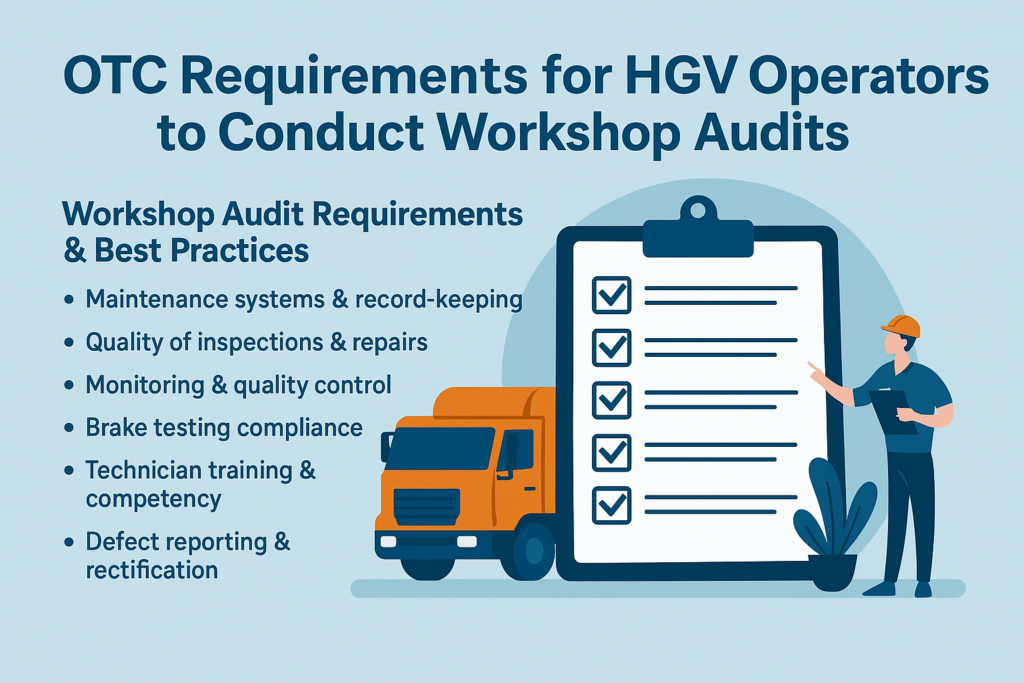
OTC Requirements for HGV Operators to Conduct Workshop
Audits
Ensuring vehicle roadworthiness and maintenance compliance
is at the heart of every operator’s licence. While the Office of the Traffic
Commissioner (OTC) does not explicitly require operators to conduct workshop
audits, they are strongly recommended as part of good practice—and are often a
key focus in DVSA investigations and Public Inquiries.
In this blog, we explore the role of workshop audits in
supporting HGV operator compliance and outline what’s expected.
Why Workshop Audits Matter
Regular workshop audits help operators:
✅ Identify non-compliance before
a DVSA inspection or Public Inquiry
✅
Strengthen operator licence compliance and reduce the risk of prohibitions
✅
Meet FORS, Earned Recognition, and other audit scheme standards
✅
Avoid OCRS penalties caused by poor maintenance practices
Whether your maintenance is in-house or outsourced, audits
provide clarity, accountability, and confidence that standards are being
upheld.
Workshop Audit Requirements & Best Practices
1. Maintenance Systems & Record-Keeping
- Maintain
a robust vehicle maintenance system.
- Keep
safety inspection records, defect reports, and repair logs for at least 15
months.
2. Quality of Inspections & Repairs
- Vehicles
and trailers must be inspected every 6–8 weeks (or as per operating
schedule).
- Technicians
must use suitable equipment and carry out repairs competently.
3. Monitoring & Quality Control
- If
using a third-party provider, ensure they meet DVSA standards.
- Internal
workshops should undergo routine checks or independent audits.
- Audits
help identify gaps before issues become enforcement actions.
4. Brake Testing Compliance
- Every
vehicle and trailer must undergo 4 brake tests per year, including
the MOT.
- Audits
confirm procedures are correctly followed and fully documented.
5. Technician Training & Competency
- Maintenance
staff must be trained and competent.
- Third-party
technicians must also meet compliance and industry standards.
6. Defect Reporting & Rectification
- A
clear defect reporting system must be in place.
- Audits
ensure issues are logged, investigated, and resolved properly.
How Often Should Workshop Audits Be Conducted?
While there’s no set legal requirement, best practice
suggests:
- Annually
for most operators
- Bi-annually
or quarterly for higher-risk fleets or those using external
maintenance
Regular audits reduce the risk of roadside prohibitions,
missed defects, and enforcement notices.
How SH Consultancy Can Help
At SH Consultancy, we offer independent, expert-led
workshop audits designed to help HGV operators meet DVSA and OTC expectations.
Our audits include:
✔ On-site reviews of maintenance
records, systems, and workshop procedures
✔ Brake testing and inspection tracking
✔ Defect rectification reviews
✔ Technician competency and training checks
✔ Clear, actionable reports to guide continuous
compliance improvements
Need peace of mind and practical support for your workshop
compliance?
📞
Get in touch with SH Consultancy today to book a free initial
consultation.
Let’s protect your operator licence—and keep your fleet safe, legal, and
road-ready.

